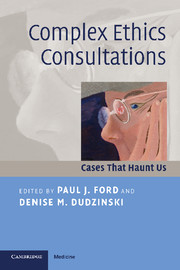Book contents
- Frontmatter
- Contents
- List of contributors
- Foreword
- Acknowledgments
- Introduction: Live and learn: courage, honesty, and vulnerability
- Part I Starting at the beginning: prenatal and neonatal issues
- Part II The most vulnerable of us: pediatrics
- Part III Diversity of desires and limits of liberty: psychiatric and psychological issues
- Part IV Withholding therapy with a twist
- Part V The unspeakable/unassailable: religious and cultural beliefs
- Part VI Human guinea pigs and miracles: clinical innovations and unorthodox treatment
- 21 Amputate my arm, please. I don't want it anymore
- 22 Feuding surrogates, herbal therapies, and a dying patient
- 23 One way out: destination therapy by default
- 24 Altruistic organ donation: Credible? Acceptable?
- Part VII The big picture: organizational issues
- Conclusions, educational activities, and references
- Index
22 - Feuding surrogates, herbal therapies, and a dying patient
Published online by Cambridge University Press: 03 May 2010
- Frontmatter
- Contents
- List of contributors
- Foreword
- Acknowledgments
- Introduction: Live and learn: courage, honesty, and vulnerability
- Part I Starting at the beginning: prenatal and neonatal issues
- Part II The most vulnerable of us: pediatrics
- Part III Diversity of desires and limits of liberty: psychiatric and psychological issues
- Part IV Withholding therapy with a twist
- Part V The unspeakable/unassailable: religious and cultural beliefs
- Part VI Human guinea pigs and miracles: clinical innovations and unorthodox treatment
- 21 Amputate my arm, please. I don't want it anymore
- 22 Feuding surrogates, herbal therapies, and a dying patient
- 23 One way out: destination therapy by default
- 24 Altruistic organ donation: Credible? Acceptable?
- Part VII The big picture: organizational issues
- Conclusions, educational activities, and references
- Index
Summary
Case narrative
Ethics consultations typically share common characteristics. For instance, they are often called when conflict is already full-blown, when discord exists between surrogates and the healthcare team, and when there are disparities between the accounts of patient preferences given by surrogates. This case reflected all of these traits. However, deeply entrenched tensions combined with periods of profound sadness and misunderstanding made the case more complicated.
I participated in this consult while completing a postdoctoral fellowship in clinical ethics. I worked on the case with the full-time bioethicist for a large community hospital where I was doing a rotation. What follows is an abbreviated version of a complex case that took place over a couple of months.
Mr. Nelson was an 87-year-old man with metastatic cancer and dementia. Prior to being admitted to the palliative-care unit, Mr. Nelson had been admitted to a medicine floor after being found unconscious on the floor of his home. Mr. Nelson had given power of attorney for health care to his son and daughter to share equally, though his daughter was his primary caregiver.
While on the medicine floor Mr. Nelson was found to be incapable of making treatment decisions, probably due to the metastases in his brain. After being transferred to the palliative-care unit, Mr. Nelson remained confused and cried a good portion of the time. Due to a fractured right hip that occurred when he fell at home, Mr. Nelson evidenced pain when he was moved.
The relationship between healthcare surrogates was strained at best, full of deep and long-standing conflict that carried over to the treatment plan and healthcare team.
- Type
- Chapter
- Information
- Complex Ethics ConsultationsCases that Haunt Us, pp. 172 - 178Publisher: Cambridge University PressPrint publication year: 2008



